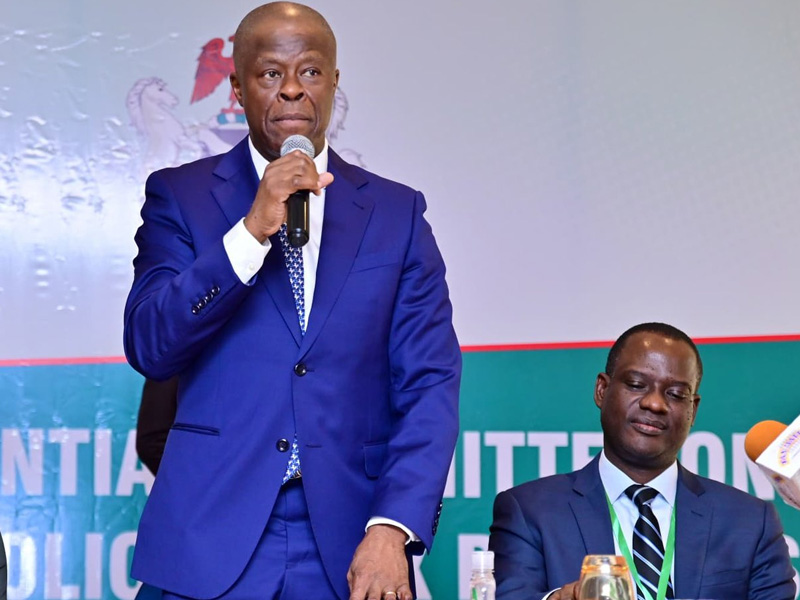Top Stories
Nigerian Government Confirms No Immediate 5% Fuel Tax Implementation

The Nigerian government has assured citizens that there are no immediate plans to introduce a 5% fuel tax, following concerns over rising living costs. During a press conference held in Abuja on October 10, 2023, the Minister of Finance and Coordinating Minister of the Economy, Wale Edun, emphasized that the proposed surcharge would not take effect now or on the scheduled date of January 1, 2026.
The announcement comes in the wake of a 14-day ultimatum issued by the Trade Union Congress of Nigeria (TUC), which threatened a total shutdown of the economy if any tax surcharge was imposed. Edun stated that while the Tax Administration Act will become operational in 2026, the fuel surcharge included in the Act will not automatically be enacted.
“The tax reform bills and the tax act will not become operational until January 1, 2026,” Edun clarified. He explained that a formal process must occur before any surcharge can be implemented, including a commencement order from the Minister of Finance, which must be published in a gazette.
The finance minister further noted that the surcharge has been a long-standing provision since its introduction in 2007 under the Federal Road Maintenance Agency (FERMA) Act. Its inclusion in the upcoming Tax Administration Act aims to consolidate existing laws rather than introduce new tax measures. Edun remarked, “The inclusion of the surcharge in the 2025 Nigeria Tax Administration Act does not mean an automatic introduction of new tax.”
Clarifications on the Fuel Surcharge’s Purpose
During the press conference, Edun highlighted the importance of the surcharge for improving Nigeria’s deteriorating road infrastructure. He stated that historically, 40% of the revenues from such user charges would fund FERMA, while 60% would go to state road management agencies. This funding is crucial for maintaining road safety and facilitating economic growth, as the road network is vital for the transportation of goods.
Chairman of the Presidential Committee on Fiscal Policy and Tax Reforms, Taiwo Oyedele, echoed Edun’s sentiments, asserting that no date has been set for the surcharge’s implementation. He reiterated that the surcharge aims to create a dedicated fund for road maintenance rather than exacerbate financial burdens on citizens.
Speaking on Channels Television, Oyedele stated, “As long as it is not gazetted, it cannot take off with the tax law.” He emphasized that the proposed surcharge is a continuation of a measure established by a previous government, and not a new initiative by President Bola Tinubu’s administration.
Oyedele expressed concerns regarding the TUC’s threat of a strike, questioning their rationale since the surcharge has not been imposed yet. “The TUC should have complained and protested when this was introduced in 2007,” he said, pointing out that the current administration is not responsible for the surcharge’s existence.
Addressing Economic Pressures and Infrastructure Needs
Both Edun and Oyedele acknowledged the current economic pressures faced by Nigerians. They highlighted that the government is committed to strengthening tax governance and enhancing revenue collection efficiency without placing additional burdens on citizens.
Oyedele remarked on the broader implications of poor road infrastructure on inflation and logistics costs. He noted that Nigeria has approximately 200,000 kilometres of roads, with only 60,000 paved, leading to inefficiencies in transportation. “The majority of the issues are to do with the state of the roads and the multiple taxes being collected whenever you move goods around,” he stated.
The chairman pointed out that the removal of fuel subsidies has created additional fiscal space, but the revenues generated are insufficient to address the significant infrastructure gap in the country. He assured Nigerians that the surcharge would be implemented thoughtfully, with timing considerations to mitigate potential inflationary effects.
“We can time it at a period when there is an appreciation in the value of the currency,” Oyedele explained. He stressed the importance of using the funds from the surcharge to improve road infrastructure, which in turn could lower transportation costs and enhance the overall economic landscape.
In conclusion, the Nigerian government seeks to reassure its citizens that any potential fuel surcharge will not be introduced hastily. The focus remains on reforming tax policies and improving infrastructure to foster economic stability and growth.
-

 Health3 months ago
Health3 months agoNeurologist Warns Excessive Use of Supplements Can Harm Brain
-

 Health3 months ago
Health3 months agoFiona Phillips’ Husband Shares Heartfelt Update on Her Alzheimer’s Journey
-

 Science2 months ago
Science2 months agoBrian Cox Addresses Claims of Alien Probe in 3I/ATLAS Discovery
-

 Science2 months ago
Science2 months agoNASA Investigates Unusual Comet 3I/ATLAS; New Findings Emerge
-

 Science1 month ago
Science1 month agoScientists Examine 3I/ATLAS: Alien Artifact or Cosmic Oddity?
-

 Entertainment5 months ago
Entertainment5 months agoKerry Katona Discusses Future Baby Plans and Brian McFadden’s Wedding
-

 Science1 month ago
Science1 month agoNASA Investigates Speedy Object 3I/ATLAS, Sparking Speculation
-

 Entertainment4 months ago
Entertainment4 months agoEmmerdale Faces Tension as Dylan and April’s Lives Hang in the Balance
-

 World3 months ago
World3 months agoCole Palmer’s Cryptic Message to Kobbie Mainoo Following Loan Talks
-

 Science1 month ago
Science1 month agoNASA Scientists Explore Origins of 3I/ATLAS, a Fast-Moving Visitor
-

 Entertainment2 months ago
Entertainment2 months agoLewis Cope Addresses Accusations of Dance Training Advantage
-

 Entertainment4 months ago
Entertainment4 months agoMajor Cast Changes at Coronation Street: Exits and Returns in 2025









